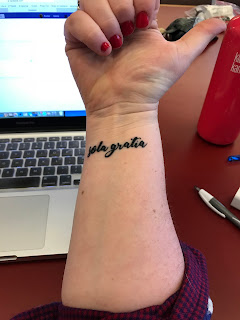 I have been thinking about getting a new tattoo for over a year. For a while, I thought
I have been thinking about getting a new tattoo for over a year. For a while, I thoughtabout the phrase I read in a book by Augusten Burroughs: “Harder is just harder”. I felt comforted at the idea that harder isn’t impossible, it’s just harder. However, the right time and place for that tat never materialized.
That idea faded when I came upon another phrase: fida et audax- faithful and bold. I loved the idea of this motto and it made me feel strong and courageous to imagine it on my wrist or on an ankle. This was my plan until about 3 weeks ago.
A variety of life events came to a culmination and I found that I was exhausted, frustrated, and tense. Overwhelmed by all things that seemed insurmountable, I marinated in the idea that in this intense time, I couldn’t “do” very much. All I could do was be.
Be.
I’m not very good at being. I am good at doing. I am good at thinking. I am okay at feeling, but I tend to put that aside for what I think I should do.
I went to visit a friend in New York. She was with me in 2005 when I got my first tattoo. Getting my second with her was a natural choice, but as I thought about what I wanted, I realized that I couldn’t get fida. That was about doing. It was about actions, resistance, and persistence. Those things are very important to me, but if I was getting a permanent reminder... I don’t need one for how to do, I need one for how to be.
Then I knew... I would get sola gratia- grace alone. One of the rallying cries of the reformations of the 16th century, this phrase grounds me not in my own doing, but in God’s doing. In light of God’s doing, my response is to be. Being beloved. Being saved. Being healed. Being welcomed. Being held. By grace alone. Not by my doing, my thinking, or my successes or failures.
By grace. Alone.
So now it is permanently inked into my wrist. It is a reminder that what I am, first and last, is God’s. Thus, whether I am trying the hard thing, the bold thing, the faithful thing... there is always time to still myself. To know I am loved. To be washed again in grace alone.
Comments